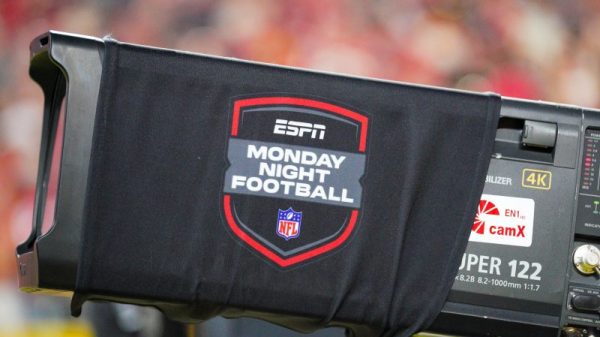
A gender discrimination lawsuit against Stephen F. Austin State University could have national implications after U.S. District Judge Michael J. Truncale ordered SFA to reinstate three women’s sports teams Friday, Aug. 1.
Six Stephen F. Austin State University (SFA) athletes from the women’s bowling and beach volleyball teams filed a class action lawsuit in the Eastern District of Texas against their school this summer claiming Title IX discrimination after the university announced in May it would be cutting those two programs and men’s and women’s golf effective the end of the 2024-25 academic year. “The decision was based on sustained departmental budget deficits and the anticipated financial impact of upcoming revenue-sharing requirements with Division I athletes” SFA athletics said in a press release.
The plaintiffs sought to keep the school from axing these programs.
SFA argued that the plaintiffs’ case is based ‘exclusively on a three-part test contained in guidance and interpretation documents,” rather than the Title IX statute itself. Defendant lawyers urged the court to disregard the policy interpretation handed down by the U.S. Department of Education 46 years ago, citing the 2024 Supreme Court ruling Loper-Bright Enterprises v. Raimondo. If the court declined, however, defendant lawyers claimed SFA still complies with Title IX under the 1979 guidance.
After two days in court, spanning 17 hours and 14 witnesses, Judge Truncale issued a written ruling in favor of the plaintiffs. SFA has been ordered to reinstate all three women’s teams. Truncale affirmed that the Loper-Bright case cannot be applied to Title IX in what plaintiff attorney John Clune called an ‘incredibly important’ win for gender equity in sports.
‘If a court were to find that Loper-Bright meant that the Department of Education was not allowed to rely on policy interpretations of their own regulations, the entire framework for compliance with gender equity in sports would be thrown out the window,’ Clune told USA TODAY. ‘You’d still be required to have gender equity in sports, but what that means and how you decided would no longer exist.
‘… Really happy about the ruling, but we’re not surprised by the ruling. If you follow the law, this is what the outcome should be.’
SFA will appeal the ruling, university spokesperson Korbin Pate told USA TODAY. In an official statement on the decision, SFA said “We remain confident in the legality and rationale behind our decision to reduce the number of sports we sponsor. … Since there was no evidence that the difficult decision to cut these four teams was based on sex, we maintain that our actions are fully compliant with Title IX requirements.”
What is the three-part test?
Under the Department of Education’s three-part test, a school can be in compliance with the participation aspects of Title IX in any one of the following ways:
- The number of male and female athletes is substantially proportionate to their respective enrollments; or
- The institution has a history and continuing practice of expanding participation opportunities responsive to the developing interests and abilities of the underrepresented sex; or
- The institution is fully and effectively accommodating the interests and abilities of the underrepresented sex.
The plaintiffs in this case argued that SFA violated all three prongs. The plaintiffs filed a report by former chief executive officer of the Women’s Sports Foundation, expert witness Donna Lopiano, Ph.D., to prove such. Using EADA data and annual NCAA participation reports, Lopiano wrote that women made up 62.8% of SFA’s enrollment during the 2023-24 academic year but less than 35% of SFA’s varsity athletes.
SFA cited the 2024 Supreme Court ruling Loper-Bright Enterprises v. Raimondo in an effort to have the three-part test thrown out. The Supreme Court’s decision made in favor of Loper-Bright overturned a 40-year precedent known as “the Chevron doctrine” directing courts to defer to government agency interpretations of ‘ambiguous’ laws. But Judge Truncale wrote in his decision that Loper-Bright is about an agency’s interpretation of a statute, not an agency’s interpretation of its own regulation. He also wrote that Loper-Bright does not overturn any case law that previously interpreted policy. Thus, it does not apply to Title IX’s 1979 policy interpretation.
Breaking down the Title IX lawsuit against Stephen F. Austin State University
Sophia Myers, Kara Kay, Ryann Allison, Elaina Amador, Berklee Andrews and Meagan Ledbetter filed a class action lawsuit on June 30 against Stephen F. Austin State University (SFA) after it announced the elimination of women’s beach volleyball, women’s bowling and men’s and women’s golf on May 22. The six plaintiffs, represented by renowned Title IX attorneys Clune and Arthur Bryant, are current athletes on the women’s beach volleyball and bowling teams.
They argued that the university violated Title IX by depriving them of equal opportunity in intercollegiate athletics and sought an emergency preliminary injunction to preserve the three women’s programs “and all other women’s teams at SFA, until this case is resolved.”
‘Title IX mandates that schools provide equal participation opportunities for men and women to compete in intercollegiate sports,’ the initial complaint read. ‘Nonetheless, SFA has a long history of depriving female athletes of an equal opportunity to participate. Consistent with that history, SFA opted to further discriminate against women in violation of Title IX by eliminating three successful women’s teams: beach volleyball, bowling, and golf. SFA’s decision undercuts Plaintiffs’ civil rights and, if permitted to move forward, will irreparably harm their academic and athletic careers.’
SFA, represented by Marlayna Marie Ellis and Sheaffer Kristine Fennessey of the attorney general’s office, argued that the plaintiff’s case is based ‘exclusively on a three-part test contained in guidance and interpretation documents, rather than the statute or 1975 implementing regulation.” Defendant lawyers urged the court to disregard the three-part test but affirmed that SFA is Title IX compliant regardless, citing the test’s first and third prongs.
The first prong requires “the number of male and female athletes is substantially proportionate to their respective enrollments.” The third requires “the institution is fully and effectively accommodating the interests and abilities of the underrepresented sex.” Defendant lawyers claimed there is “no strict rule” defining ‘substantially proportionate,” and that SFA “effectively accommodates the interest and abilities of women, despite the discontinuation of the women’s beach volleyball, bowling, and golf teams.”
Financial pressure from House settlement not valid defense for cutting women’s sports
SFA opted into the House settlement, where schools are able to pay athletes directly starting this athletic year with a $20.5 million cap per institution. These new financial pressures are why athletic director Michael McBroom said the decision to cut teams was made.
The athletic department reported a $1 million surplus during the 2024 fiscal year, with about $24 million in institutional support out of $28.8 million in total operating revenue. In FY2023, SFA reported a $61,000 deficit, with $19.4 million in institutional support. And in FY2022, SFA reported a $275,000 deficit, with $17.7 million institutional support.
Plaintiffs argued, successfully, that ‘budgetary constraints are not a legitimate defense to Title IX.’
‘The funding of those revenue-sharing payments for football players and men’s basketball absolutely cannot come at the expense of women’s sports,’ Clune said. ‘So this is a huge message to schools across the country. Whatever you have to do to figure out how you’re going to fund your revenue-sharing payments, it’s not going to come at the expense of women’s opportunities to participate in sports. That’s a big deal.’
Reach USA TODAY Network sports reporter Payton Titus at ptitus@gannett.com, and follow her on X @petitus25.
This story has been updated with new information.





























